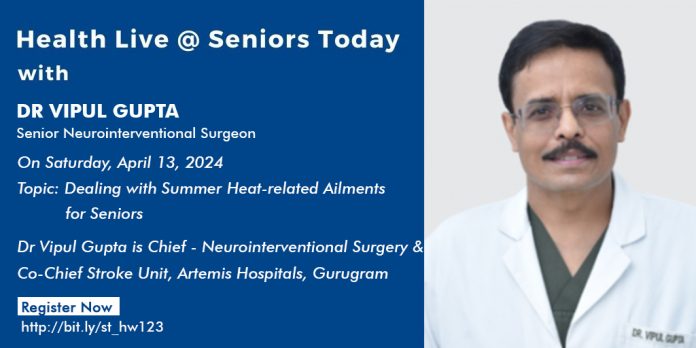On 13 April, 2024, Seniors Today hosted their weekly Health Live Webinar with Dr Vipul Gupta, a Senior Neurointerventional Surgeon who spoke on and answered questions about Summer Heat related Ailments.
Dr. Vipul Gupta is trained in Interventional Neuroradiology from All India Institute of Medical Sciences, New Delhi where he also worked as Associate Professor till 2005. He completed his fellowship from Foundation Rothschild, Paris (2005) and Cleveland clinic USA (1999).
Dr. Gupta has been a visiting Professor in UMASS General Hospital, Boston, USA.
He specialises in Intracranial Aneurysms Embolization (coiling), ArterioVenous Malformation (AVMs), Tumour Embolization, Angioplasty and Stenting of arterial stenosis including carotid stenting and Intra-arterial Thrombolysis for stroke.
He has more than 45 publications in journals and 7 chapters in books to his credit. He has done more than 40 abstract (paper) presentations in Indian and International conferences. He is also a prestigious member of many national and international associations.
He was awarded with IMA Award in 2006, I.M.A. Academy of Medical Specialities Award in 2007. He was also featured in Hindustan Times as one of the “Top 10 Young Surgeons” in the country.
Prior to joining Artemis, he has worked as Head- Interventional Neuroradiology in Max Institute of Neurosciences till 2009 and Head – Interventional Neuroradiology/Neurointerventional Surgery in Medanta the Medicity till May 2016.
We are all well aware about global warming and the effect it has on the temperature, which is why we have been seeing a steep rise in the ambient temperature. Last March was the hottest month recorded. The temperature in Delhi is as high as 39 to 40 C. So clearly, this year we expect a very bad heat wave.
There are a lot of unusual risk factors resulting in stroke and heart attack, one of which can be a heat related ailment.
Even one degree rise in temperature will increase the risk of stroke and heart attack by 2-3%
And if there is a heat wave there is a 10% higher chance of heart attack and stroke.
Effects of dehydration on our body:
- When the temperature rises, our body tends to lose heat in the form of perspiration, and by perspiring, we are losing water from our body in the form of sweat, leading to dehydration. Which means less fluid in our blood vessels and dilation of the blood vessels in our skin to facilitate more flow of blood for heat loss to maintain the core body temperature. Diversion of the blood flow to the skin can lead to insufficient blood flowing to critical organs.
- Loss of body fluid and water will also lead to thickening of the blood and clot formation, these clots can get dislodged and enter the heart or brain, leading to heart attack or stroke.
- The heat itself can give rise to arrhythmias causing irregular heart beat and changes in the blood pressure.
Risk and predisposing factors for heat related illnesses:
- Age more than 65 years, babies and young children
- Pregnant mothers
- Individuals with an underlying renal disease
- Individuals on multiple medications some of which may have the side effect of inhibition of perspiration- these individuals are also more prone to heart attacks and stroke
- Individuals living in areas prone to hot temperatures
- Individuals from lower income countries
- Air pollution is a modern risk factor
Precautions and preventive measure:
- Avoid dehydration. Unless you have a heart disease or relax disease which requires you to limit your fluid intake, you should make conscious efforts to drink water and keep yourself hydrated.
- If you plan on visiting the outdoors, you should the your visits carefully and avoid peak temperature and humidity hours
- Always carry water with you
- Wear light colours and light material clothes
- Beware of signs of dehydration
Signs of dehydration:
- Dryness of mouth
- Excessive thirst
- Decrease in urine output
- Dark yellow coloured/ concentrated urine
- Dizziness/ easy fatigability
Adequate hydration will also help in maintaining your body temperature as well as body fluids
The World Health Organisation (WHO) says that 1 in 4 individuals suffer from a minor or major attack of brain stroke.
It is also the 3rd most common cause for morbidity and mortality.
Stroke or brain stroke is due to insufficient supply of blood and oxygen to the brain leading to death of the brain cells.
This can be either due to damage to the blood vessels of the brain due to blockage or due to rupture of a blood vessel leading to haemorrhage and bleeding.
Patients of stroke can present with:
- Weakness of one side of the body (paralysis)
- Twisting or drooping of one side of the face
- Inability to lift their arm(/s) or leg(/s)
- Inability to speak or slurring of words
- Difficulty in understanding and following commands and instructions
Similarly, heart attack is caused when there is insufficient blood supply to the muscles of the heart.
A stroke/ brain stroke should not be confused with heat stroke which is an extreme form of effects of heat on the body following exposure to harsh heat and inefficient efforts to control the body temperature and maintain hydration. This leads to rise in body temperature. When the body temperature rises to or beyond 40 degree celsius (104 degree Fahrenheit) the blood flow to the organs can get severely impaired and damaged.
These patients can present as :
- Confused state of mind
- Disoriented
- Warm/ hot body to touch
- High heart rate
- Rapid and shallow breathing
Heat stroke is a medical emergency.
The treatment of heat stroke includes:
- Immediate transfer of the patient to a cool/ cold room
- Sips of water- in case of a conscious patient
- Remove extra clothing
- Cold sponging
These patients should immediately be transferred to a tertiary care centre.








